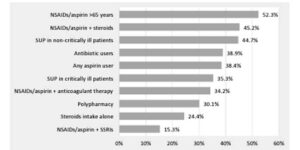HIGHLIGHTS
- The study aims to evaluate physician prescribing patterns, assess their knowledge of proton pump inhibitors, and identify factors influencing their knowledge.
- An online survey of Latin American and Spanish physicians assessed proton pump inhibitor usage patterns and case-scenario responses, categorizing knowledge, and conducting subgroup analysis based on training, experience, specialty, and literature review timing.
- Thirty-eight percent of surveyed physicians commonly prescribed proton pump inhibitors, and among them, 80% were unfamiliar with deprescribing strategies, with 54.4% rarely reviewing ongoing indications.
- Sufficient knowledge was correlated with recent literature reviews and medical specialty affiliations.
ABSTRACT – Background –
Proton pump inhibitors (PPIs) are widely prescribed worldwide, often resulting in their overuse. Consequently, it is essential to identify the likely causes of this overuse to facilitate their appropriate prescription. Objective – This study aims to assess physician prescribing patterns, their knowledge of PPIs, and factors affecting their knowledge. Methods – An online survey was conducted among Latin American and Spanish physicians, collecting the following data: professional information, patterns of PPI usage, familiarity with published evidence, and the management approach in three hypothetical case-scenarios. Participant knowledge was categorized as sufficient or insufficient based on the results of the case scenarios. Subsequently, subgroup analysis was performed based on physician training level, years in practice, specialty, and time since the last PPI literature review. Results – A total of 371 physicians participated in the survey. Thirtyeight percent frequently prescribe PPIs, primarily for prophylactic purposes (57.9%). Eighty percent were unfamiliar with PPI deprescribing strategies, and 54.4% rarely reviewed the ongoing indication of patients taking a PPI. Sixty-four percent demonstrated sufficient knowledge in the case-scenarios. A significant association was observed between specialty type (medical vs surgical: 69.4% vs 46.8%, P<0.001), the timing of the PPI indication literature review (<5 years vs >5 years: 71.4% vs 58.7%, P=0.010), and sufficient knowledge. Conclusion – While most participants prescribed PPIs regularly and for prophylaxis purposes, the majority were unfamiliar with deprescribing strategies and rarely reviewed ongoing indications. Sufficient knowledge is correlated with recent literature reviews and medical specialty affiliation.
AUTORES
Jean Félix PIÑERÚA-GONSÁLVEZ, Rosanna del Carmen ZAMBRANO-INFANTINO, Julio César ALBORNOZ-SANDOVAL, Pedro Waykin TONG-MORAO, Mariangel Nohemy LEÓN-HERNÁNDEZ, Barbara Daniela MATHEUS-ALONSO, Frank SUÁREZ-LÓPEZ, Yormalis FLORES, Santos Neomar HIGUERA, María Lourdes RUIZ-REBOLLO and Mariseli SULBARAN.


